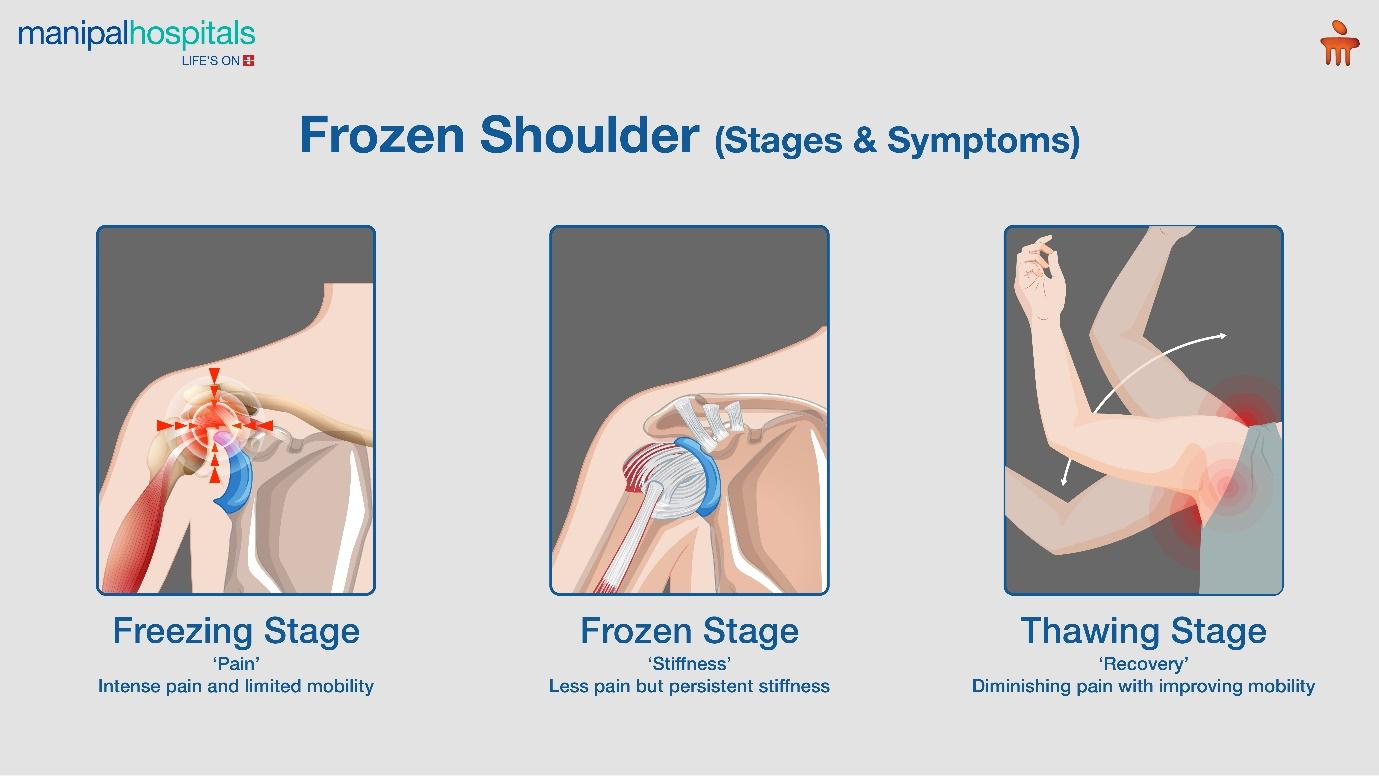
Does your shoulder hurt even with the slightest movement? Is it difficult to raise or rotate your arm? These could be signs of a frozen shoulder. Also known as adhesive capsulitis, this condition causes pain and stiffness in the shoulder joint, gradually reducing its range of motion. It often develops slowly but can significantly affect daily activities like dressing, reaching overhead, or lifting objects. Frozen shoulder is more common in people aged 40 to 60 and tends to affect women more than men. If you are noticing these symptoms, it is best to consult a doctor for timely diagnosis and care.
Synopsis
Symptoms of Frozen Shoulder
Frozen shoulder symptoms typically develop in three stages. These stages are distinctly different from each other, depending on the extent of pain and stiffness.
-
Freezing Stage (Painful Stage): This stage is marked by intense pain and limited ability to move the shoulder. Shoulder pain intensifies at night and aggravates with activity. This typically continues for 6 to 9 months.
-
Frozen Stage (Stiff Stage): Pain lessens to an extent, but stiffness persists. This lasts for 4 to 12 months with limited range of motion, causing difficulty in performing daily activities like dressing, lifting, or combing hair.
-
Thawing Stage (Recovery Stage): The range of motion gradually improves while the pain keeps diminishing. However, the shoulder may not return to a full range of motion in all cases. This lasts for 6 to 12 months.

Frozen Shoulder Causes
Though the actual cause of frozen shoulder is unknown, a few factors can lead to the development of this painful condition, including:
-
Injury or trauma to the shoulder
-
Prolonged immobility (e.g., after surgery or fracture)
-
Thyroid disorders (hypo/hyperthyroidism)
-
Parkinson’s disease
-
Cardiovascular disease
-
Autoimmune conditions
-
Post-stroke complications
Diagnosis
A physical examination is done, and a detailed history of the patient is taken. Doctors assess range of motion and pain levels. Imaging tests like X-rays or MRI may be used to rule out other shoulder conditions such as arthritis or rotator cuff tears.
Recovery and Treatment
Treatment aims to alleviate pain and restore as much mobility as possible. The approach often depends on the stage of the condition and its severity. Recovery takes several months to years. Most people improve with non-surgical measures.
1. Non-Surgical Treatments
The condition can be treated with several non-surgical options. These include:
• Physical Therapy:
- Core to recovery.
- Includes gentle stretching and range-of-motion exercises.
- This must be done consistently and under guidance to avoid worsening pain.
• Medications:
- Nonsteroidal Anti-inflammatory Drugs (NSAIDs) help in easing pain and reducing inflammation.
- A few cases may call for strong pain relievers or corticosteroids
• Heat and Cold Therapy:
- Application of warm or cold compresses can help manage pain and improve mobility before exercises.
• Corticosteroid Injections:
- This decreases inflammation and pain when given directly in the shoulder joint.
- Often used during the freezing stage.
• Hydrodilatation:
- A fluid is injected into the joint capsule to stretch it and improve mobility.
- Typically done under imaging guidance.
• Acupuncture:
- Transcutaneous Electrical Nerve Stimulation (TENS) may offer relief for some patients.
2. Surgical Treatment (Rare)
If conservative methods fail and symptoms persist beyond a year or severely restrict function, surgical options may be considered:
• Manipulation Under Anaesthesia (MUA):
- The patient is given general anaesthesia, and the doctor moves the shoulder to break up adhesions.
• Arthroscopic Capsular Release:
- A minimally invasive surgery where tight portions of the joint capsule are cut to allow better movement.
Home Remedies for Frozen Shoulder
Besides medical or therapeutic intervention, one must also try frozen shoulder treatment at home. This cumulative approach can yield better outcomes. One may consider:
-
Warm compression to ease pain
-
A massage with warm oil for better blood circulation
-
Adding Epsom salt to bathing water to generate heat
-
The importance of maintaining a good posture
-
Avoiding jerks and heavy lifting
-
Practising gentle stretches 2-3 times a day
Conclusion
Frozen shoulder is painful and can interfere with daily activities. Yet, it often improves over time, even without treatment. However, the process can be lengthy, and the full range of motion may not always be restored. Early diagnosis and active management through physical therapy significantly enhance recovery and reduce long-term stiffness. If you or your loved one is going through the excruciating experience of frozen shoulder, do not wait anymore. Seek expert help to manage your symptoms better and heal much faster at the Department of Orthopaedics, Manipal Hospitals, Salt Lake.
FAQ's
No, frozen shoulder affects only the shoulder joint capsule and causes stiffness, while arthritis is a joint disease that involves inflammation and damage to joint cartilage.
To some extent, yes. Regular shoulder exercises after surgery or injury and avoiding long periods of immobility can help prevent it, especially in high-risk individuals.
No, it is not. Most people recover completely with time and proper treatment, though some stiffness may remain.
Yes, Frozen shoulder can occur in both shoulders. Yet, it does not happen at the same time in most cases. The other shoulder may get affected later.
Wall climbing, pendulum swings, finger walk, backwards towel stretches, and shoulder rotations are some exercises that help with Frozen shoulder.





















 6 Min Read
6 Min Read





















